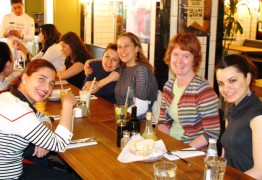 The weekend before Valentine’s Day, the Turkish Postal Service opened a “Love Post Office” in our neighborhood mall and offered free delivery of romantic messages.
The weekend before Valentine’s Day, the Turkish Postal Service opened a “Love Post Office” in our neighborhood mall and offered free delivery of romantic messages.
Two weeks ago I started classroom teaching. Twenty Turkish students, ages 19 to 21, eight of them women.
The names were my first challenge. I have Yildiz and Yalcın; Özge, Özham, Onat, Uğur and Onur; Erdi and Erşen; Gamze and Gizem and Gökalp and Gökay. None of those names tells me whether the person is male or female, and most are difficult for me to pronounce.
You start with what is easiest, and one of my female students is named Melike, so similar to Malika, my old friend and neighbor in Yemen. My best student seems to be Erdi, and I think of him as Eddie. The name Onur sounds like Honor—I was surprised to discover it actually means that in Turkish—and seems to fit this alert, blue-eyed young man.
The kids are polite and earnest, but highly sociable, which means they are very, very talkative. Turkish women cultivate musical-sounding voices, but the men’s voices are simply loud. When I give them an in-class task, they immediately begin talking, and no matter what I say or do, it takes them four or five minutes to settle down. I realize that at times they are trying to make sense of my words; I try to speak slowly, but sometimes fail.
More experienced teachers complain that the kids don’t take much initiative, and this does seem to be true. They are accustomed to authoritarian teachers, parents and government, and won’t make a move, even to leave the classroom at break time, until I tell them it is okay. Academically, they are used to simply doing what the teacher tells them to do and then trying to pass the all-important final exam.
Having their own ideas, and even being asked to share them, is not something they are accustomed to. I had a conference yesterday with a student who is registered to study in the business school. He drew business as a topic for an upcoming class presentation, which I thought fitting, but when I asked him what came to mind when he thought of that word, he simply gave me a blank look and shook his head. I spent fifteen minutes trying to draw out of him something business-related that he might want to research. He seemed to want me to tell him what he was interested in.
This last week one of my students from near the Syrian border, approached me during a break. How hard it must have been for him to formulate these words in English: “My family. . . is having . . . financial trouble. I don’t can buy the books,” came out in a whisper.
I thanked him for telling me and went straight to Nergis, our wonderful director. “Tell him to come see me,” she suggested, and when he did, she loaned him the main textbook for the entire semester. The next day I bought the supplementary book for him for 35 lira, about $20. A colleague was teaching my class that afternoon and I gave it to her to pass along to him, which made it seem less like charity.
But when he came to his conference, the first thing he did was thank me. My social skills tend to fail me in situations like that, and although touched, all I was able to do was shrug it off.
I’ve heard that languages cannot really be taught; they must be learned, and I really don’t know how best I can help these kids learn English. But I have good textbooks and some great exercises developed by folks smarter than I am, and I am enjoying my students more and more each day.




It’s fun to read about your teaching adventures. I had similar experiences both times that I taught in China. Living under an authoritarian government no doubt establishes a mindset and habits that influence all aspects of one’s life.
BTW, Emilio’s roommate at St. Cloud during his sophomore year was a kid from Turkey named Onur. Onur apparently adapted quickly to the more freewheeling lifestyle of an American campus—he ended up being put on academic probation after skipping nearly all his classes one semester. However, he ran a highly successful mini-mart out of the dorm room, selling candy, soda, Kleenex, cereal, condoms, beer, and DVDs.